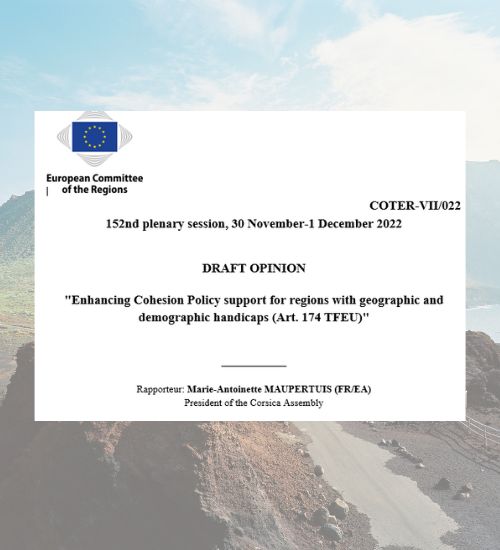
On 1st December, the European Committee of the Regions adopted the opinion of Marie-Antoinette Maupertuis (FR/EA), President of the Corsica Regional Assembly on “Enhancing Cohesion Policy support for regions with geographic and demographic handicaps (Article 174 the Treaty on the Functioning of the EU)”.
Released in early 2022, the 8th Report on economic, social and territorial cohesion in the EU reveals that there are still important disparities among European regions and in particular, rural areas lag behind. The principle of territorial cohesion is recognized by Article 174 of the Treaty on the European Union. This article states that Europe should strive for a harmonious development of its regions and a specific attention should be out on rural areas with permanent geographic, natural or demographic barriers, such as sparsely populated regions, mountains, islands, cross-border regions.
In its opinion, Ms Maupertuis called for a greater integration of these regions in the various European policies, beyond the Cohesion Policy, and she suggested concrete measures tailored to the diversity of rural territories. The European Association of Information on Local Development (AEIDL), partner of SHERPA, was among the lead experts that supported this opinion.
“The European Union does not respect its founding treaty if it doesn’t sufficiently take into account the constraints of territories like islands, mountains and rural areas. Their geographical condition implies additional costs for services like transport, energy, digital connectivity that need to be considered in order to not increase interregional disparities. Therefore, the Committee calls for the needs of these regions to be included in the development of the various EU policies with a territorial dimension, beyond Cohesion Policy“, Marie-Antoinette Maupertuis.
The debate on the plenary went on the need to reaffirm the Article 174 through the European Cohesion Policy. Besides, the European Committee of the Regions underlined that the current efforts of the European Union in promoting cohesion via the Territorial Agenda 2030 and the new Long-term vision for rural areas may be insufficient.
The work done in SHERPA also underlines a significant gap between rural and other European regions in different fields: from access to social services to digital infrastructures. Evidence from SHERPA’s results is summarised in our Rural Policy Papers.
In addition, in the next few months, SHERPA will also publish new Position Papers with key recommendations for policy and research on how to strengthen the social and digital dimension of rural areas. Stay tuned!
To know more on the plenary at the Committee of the Regions, read the press release!
Published by Carla Lostrangio